陕西省某二中高二英语课件:Module 4 Music born in America (外研版选修7)
文档属性
| 名称 | 陕西省某二中高二英语课件:Module 4 Music born in America (外研版选修7) |
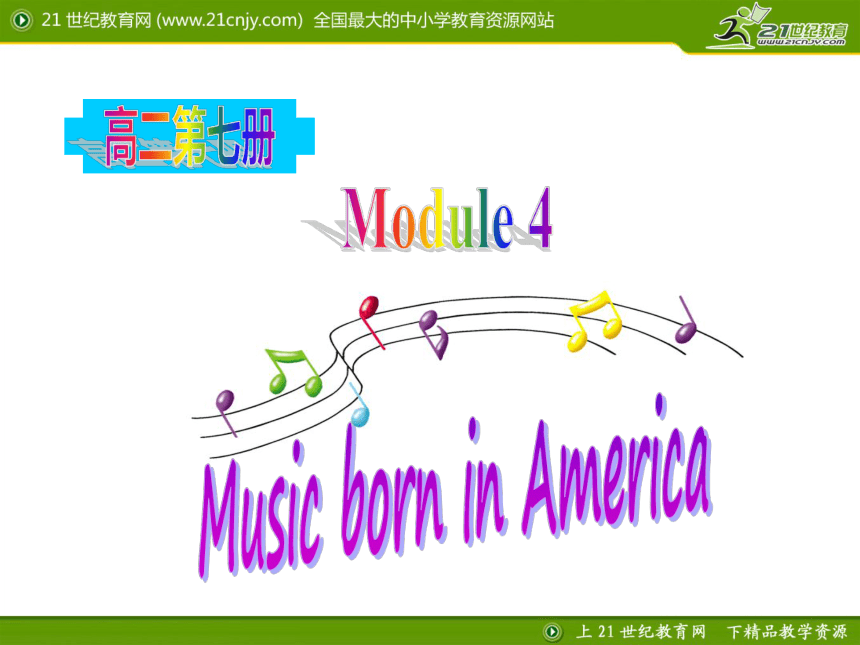
|
|
| 格式 | zip | ||
| 文件大小 | 593.9KB | ||
| 资源类型 | 教案 | ||
| 版本资源 | 外研版 | ||
| 科目 | 英语 | ||
| 更新时间 | 2012-06-22 00:00:00 | ||
图片预览




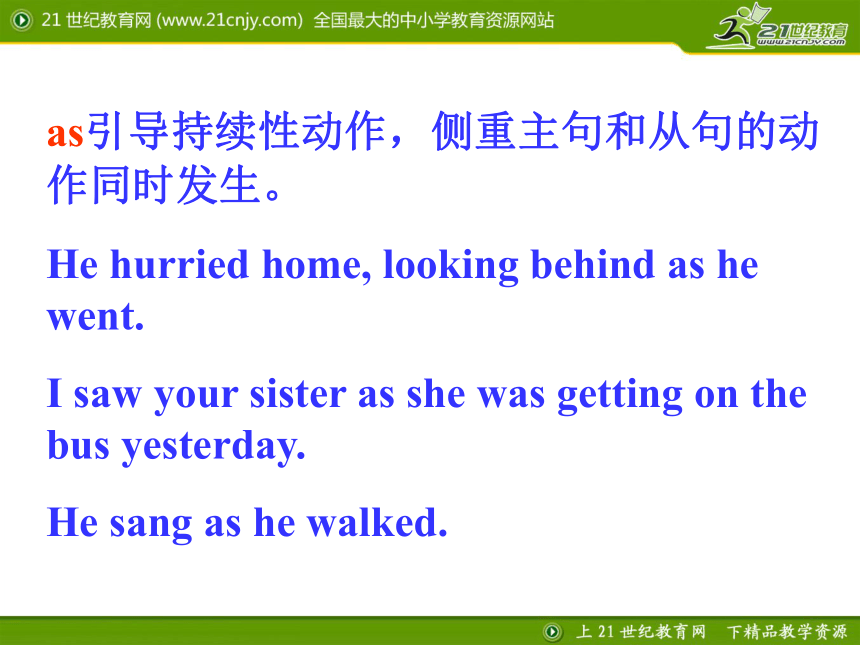
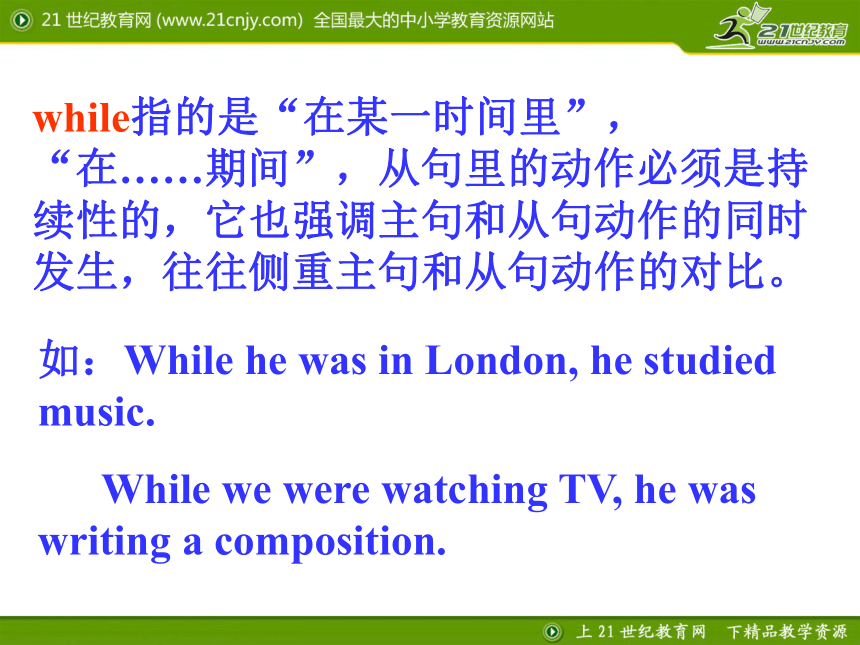

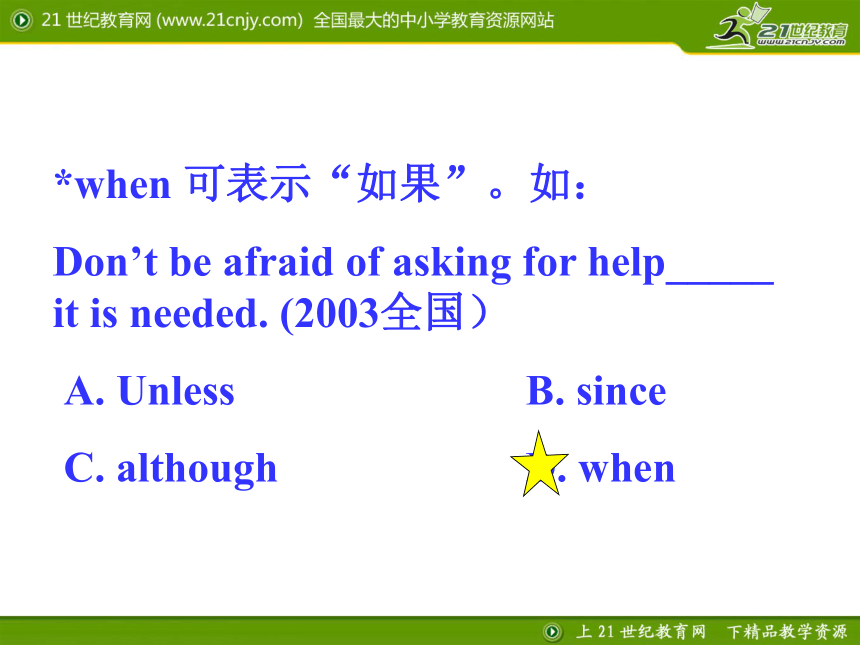
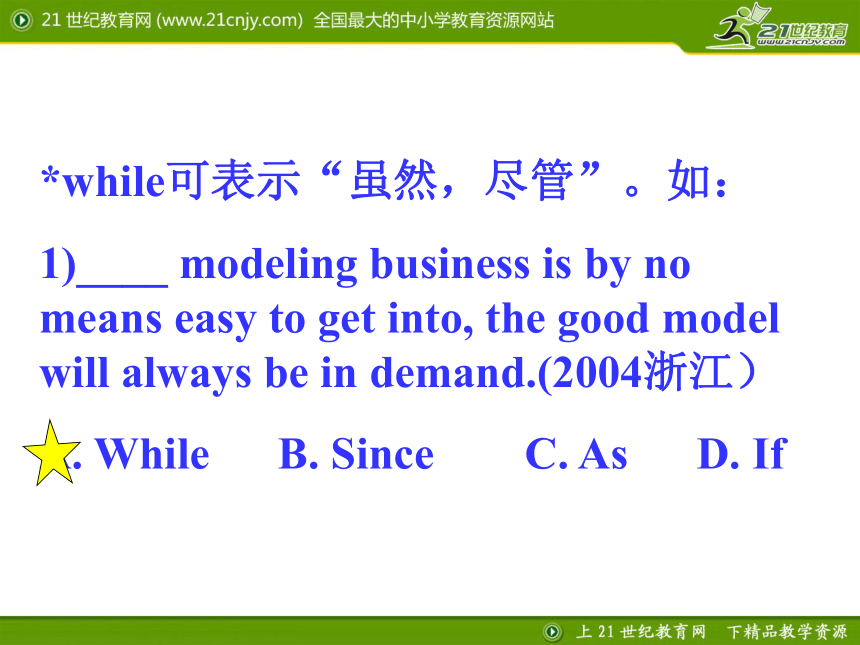
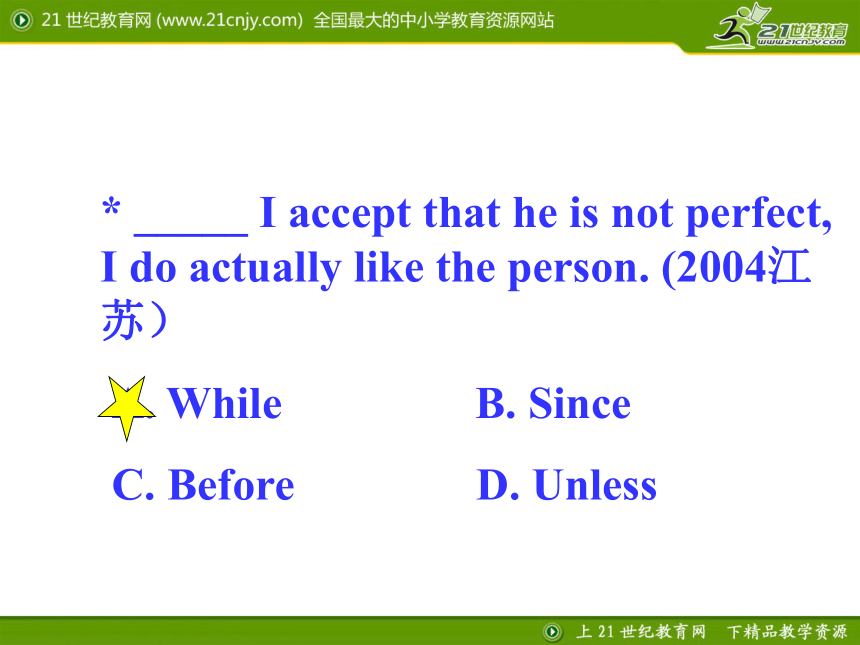
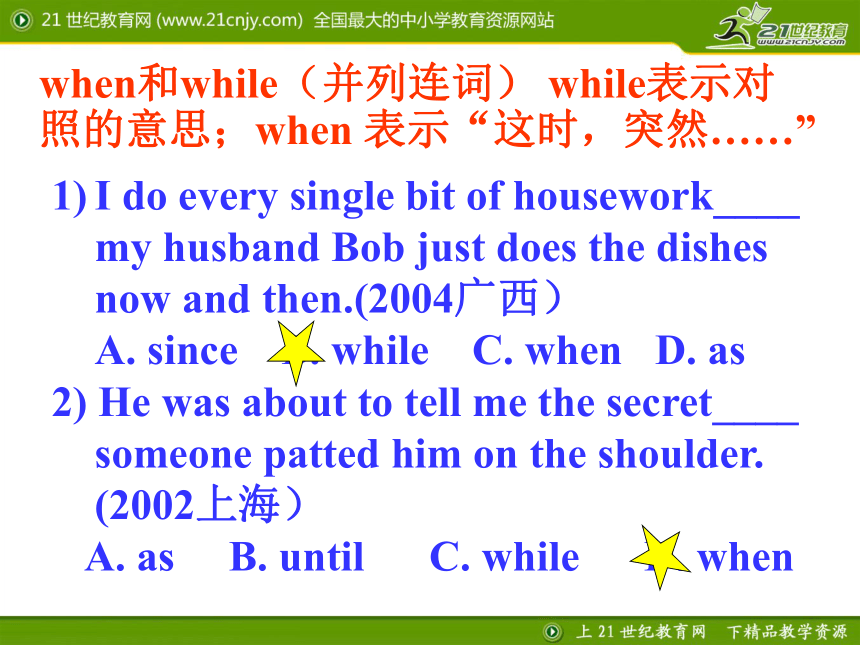
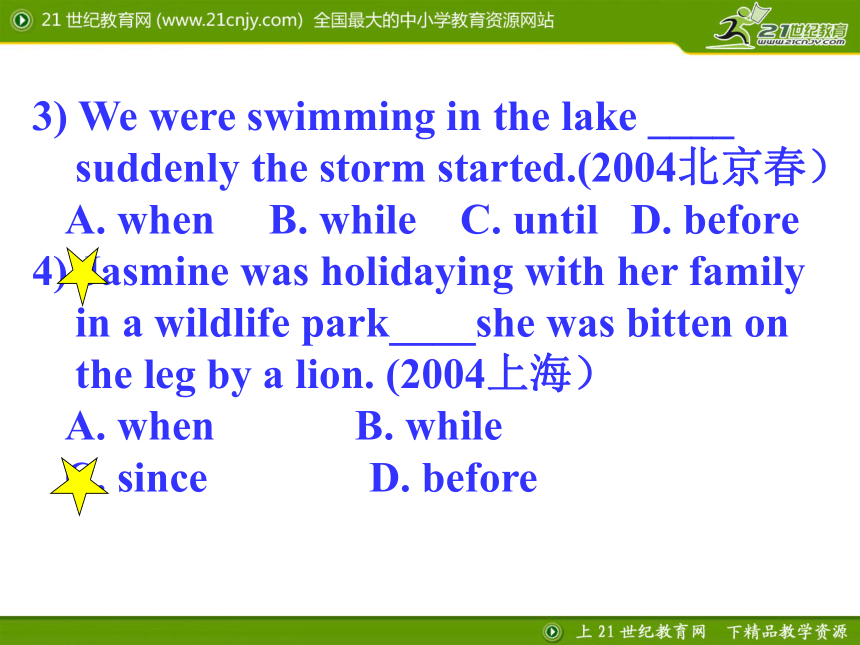
文档简介
(共72张PPT)
parts of these sentences indicate the “time”.
The moment I get the money I'll send the ticket.
I was just getting into the bath when the telephone rang.
He gets more attractive as he gets older.
Whenever I go there they seem to be in trouble.
I've been very busy since I came back from holiday.
(1)when, as, while (从属连词)
when既可引导持续性动作,又可引导短暂性动作。它可以表示主句的动作和从句的动作同时发生,或从句的动作发生在主句动作之前。如:
When I was a boy, I used to go to the seashore on Sundays.(同时)
When the lesson was over, we began our writing.(从句动作在前)
as引导持续性动作,侧重主句和从句的动作同时发生。
He hurried home, looking behind as he went.
I saw your sister as she was getting on the bus yesterday.
He sang as he walked.
while指的是“在某一时间里”,“在……期间”,从句里的动作必须是持续性的,它也强调主句和从句动作的同时发生,往往侧重主句和从句动作的对比。
如:While he was in London, he studied music.
While we were watching TV, he was writing a composition.
当when, as, while表示“在…一段时间里”,主从句的动作同时发生时,可以换用。如:
While (When/As) we were discussing, Mr. Smith came in.
*when 可表示“如果”。如:
Don’t be afraid of asking for help_____ it is needed. (2003全国)
A. Unless B. since
C. although D. when
*while可表示“虽然,尽管”。如:
1)____ modeling business is by no means easy to get into, the good model will always be in demand.(2004浙江)
A. While B. Since C. As D. If
* _____ I accept that he is not perfect, I do actually like the person. (2004江苏)
A. While B. Since
C. Before D. Unless
when和while(并列连词) while表示对照的意思;when 表示“这时,突然……”
I do every single bit of housework____ my husband Bob just does the dishes now and then.(2004广西)
A. since B. while C. when D. as
2) He was about to tell me the secret____ someone patted him on the shoulder. (2002上海)
A. as B. until C. while D. when
3) We were swimming in the lake ____ suddenly the storm started.(2004北京春)
A. when B. while C. until D. before
4) Jasmine was holidaying with her family in a wildlife park____she was bitten on the leg by a lion. (2004上海)
A. when B. while
C. since D. before
(2)till和until
①如果主句谓语动词是持续动词,通常用肯定式的主句,表示“直到……为止”。如:
I worked till (until) he came back.
1) A good storyteller must be able to hold his listeners’ curiosity _____ he reaches the end of the story.(2003上海)
A. when B. unless C. after D. until
2) We were told that we should follow the main road ___we reached the central railway station.(2004辽宁)
A. whenever B. until
C. while D. wherever
② 如果主句谓语动词是瞬间动词,则用否定式的主句表示“直到……才”。
如:I didn’t go to bed until (till) he came back.
3) ---Was his father very strict with him when he was at school
---Yes. He had never praised him _____ he became one of the top students in his grade.(2003春)
A. after B. unless
C. until D. when
③放在句首表示强调时一般用until。如:Until he returns, nothing can be done.
4) Not until all the fish died in the river ___ how serious the pollution was.(1995全国)
A. did the villagers realize
B. the villagers realized
C. the villagers did realize
D. didn’t the villagers realize
*如果before引导的从句位于主句之后,有时不能译成“在……之前”,而要译成“就”、“才” 等。如:
The struggle lasted four years before the North won in the end.
He almost knocked me down before he saw me.
(3)before “在……之前”
Before I came downstairs I had prepared myself very carefully for what I must say.
1) Someone called me up in the middle of the night, but they hung up ____ I could answer the phone. (2000全国)
A. as B. since C. until D. before
2) He made a mistake, but then he corrected the situation ___ it got worse. (2003北京)
A. until B. when C. before D. as
3) Scientists say it may be five or six years____ it is possible to test this medicine on human patients.(2004福建)
A. since B. after C. before D. when
4)It was evening _____ we reached the little town of Winchester.(2004天津)
A. that B. until C. since D. before
(4) by the time, each time, every time, immediately, the moment, the instant, the minute, soon after, shortly after都可以作为连词,引导时间状语。如:
By the time he was fourteen, he had taught himself advanced mathematics.
Each time he came, he would call on me.
You must show him in immediately he comes.
I recognized him the moment I saw him.
注意:时间状语从句中谓语动词不能用任何一种将来时,只能用现在时和过去时表示将来时。
--- Did you remember to give Mary the money you owed her
--- Yes, I gave it to her ______ I saw her. (2001全国春)
A. while B. the moment
C. suddenly D. once
时间状语从句:
引导时间状语从句的从属连词有:when, while, as, whenever, before, after, since, till, until, as soon as, once,the moment, immediately, no sooner…than, hardly…when, by the time, every time, last time…等。
状语从句
状语从句在主从复合句中修饰主句中的动词,形容词或副词,按意义可分为时间、地点、原因、目的、结果、条件、方式、比较、让步等状语从句。从句可放在句首,也可放在句末。放在句首时,从句后面常用一个逗号,放在句末时,从句前一般不用逗号。本模块着重讲解时间状语从句。
The field research will take Joan and Paul about five months; it will be a long time _____ we meet them again. (2007安徽)
A. after B. before C. since D. when
He was told that it would be at least three more months ________ he could recover and return to work. (2007江西)
A. when B. before C. since D. that
It is difficult for us to learn a lesson in life ______ we’ve actually had that lesson. (2007天津)
A. until B. after C. since D. when
-- Where’s that report
-- I brought it to you ____you were in Mr. Black’s office yesterday. (2007北京)
A. if B. when C. because D. before
I’m sorry you’ve been waiting so long, but it’ll still be some time ____ Brian gets back. (2008北京)
A. before B. since C. till D. after
I used to love that film ______ I was a child, but I don’t feel it that way any more. (2008辽宁)
A. once B. when C. since D. although
There were some chairs left over ___ everyone had sat down. (2008四川)
A. when B. until C. that D. where
Nancy enjoyed herself so much ____ she visited her friends in Sydney last year. (2008福建)
A. that B. which C. when D. where
我一见到他就告诉他这个消息。(as soon as)
2. 她一来到教室,就开始读英语。(as soon as)
I’ll tell him the news as soon as I see him.
As soon as she came into the classroom, she began to read English.
Translate the following sentences by using the words in brackets.
Exercises
3. 我刚一到家天就下雨了。
(no sooner … than…)
I had no sooner got home than it began to rain.
No sooner had I got home than it began to rain.
4. 他刚做完试卷,铃声就响了。(hardly … when…)
He had hardly finished the test when the bell rang.
Hardly had he finished the test when the bell rang.
5.他一来,你就可立即离开。(immediately)
6.我一见到你,就认出你来了。
(the moment)
You may leave immediately he comes.
I recognized you the moment I saw you.
7.每次见面,他都向我问候,说“你好!”
(each time / every time)
8.到18岁的时候,她已大学毕业了。
(by the time)
He greeted with “hello!” each time he saw me.
By the time she was 18, she had already graduated from the university.
Mike said that he would come to school to see me the next day, but he didn’t come to school to see me the next day.
Mike said that he would come to school to see me the next day, but he didn’t.
避免重复,减少累赘
Ellipses
Look at the following sentences, say which one is better and why.
省略句:为了避免重复,省略句中的一个或几个成分,这种语法现象称为省略。
Sorry to have kept you waiting.
Seen the movie before
I’m sorry to have kept you waiting.
Have you seen the movie before
连接紧密,结构紧凑
强调重点,突出信息
Add words which have been left out and rewrite the sentences.
John was the winner in 1994 and Bob in 1998.
-- What did you do yesterday
-- Just slept. Nothing else.
John was the winner in 1994 and Bob was the winner in 1998.
-- I just slept. I did nothing else.
简单句中的省略
1. 在对话中
-- How is your mother today
-- (She is ) Much better.
2. 在祈使句中
(You) Open the door, please.
3. 在感叹句中
What a (good) boy (he is)!
How (hard) they are working!
4. 表示讲话人的意见和看法
(It) Sounds fine to me.
(It’s a) Pity you couldn’t come.
5. 提问
(Is there) Anything wrong
(Have you) Found the bike
6. 名词所有格修饰的名词若表示店铺、住宅、教堂或上下文已暗示或明确指出过的事物
At her mother’s (house) she passed many happy days.
7. 前面出现过的动词在下文再次出现时可以单纯使用不定式符号to
I. --Will you go with me
--Well, I’d like to (go with you).
II. -- Have you ever been to the seaside
-- No, we can’t afford to (go to the seaside).
并列句中的省略
1. 后面分句中与前面相同的部分常被省略。
She was poor but (she was) honest.
2. 有时并列句中的省略部分出现在前面的分句中,看完最后一个分句才能掌握全句的完整意义。
Mary can (speak English) and Mary ought to speak English.
惯用的省略结构
1. 无动词祈使句,无主句祝愿句,这类句子往往用感叹号。
If only I could remember his name!
2. 固定句型How/What about + n. /pron. /-ing。
What about some more milk
3. Why not +省去to的动词不定式。
Why not go at once
复合句中的省略
1. 主句中的省略
1)主句的省略多见于句首,多用于口语。
(It’s a) Pity you couldn’t come.
2)在对话中答句省去整个主句只用从句。
--Shall I go to play
--If you like (you can go to play).
2. 宾语从句中的省略
1)由which,when,where,how和why 引导的宾语从句,可全部或部分省去,只保留引导词。
Please pass me one of these books, I don’t care which (you pass me).
2)在I’m afraid,I think, I believe, I hope, I guess等开头的作答句中,后面跟so 与 not 分别用于肯定或否定宾语时,宾语从句可省去。
--Do you think it will rain
--I hope not (that it will not rain).
3. 状语从句中的省略
1)状语从句出现在句末时,一般都可以作句尾省略。
Coming swimming You don’t have to (coming swimming) if you don’t want to (coming swimming) .
2)有时条件从句可以完全省去,只剩下主句。
I would have come yesterday (if I had wanted to).
3)以as, than 引导的比较状语从句可以全部或部分省去。
After half an hour, she became quieter (than she had been).
1. The research is so designed that once _______nothing can be done to change it. (2002全国)
A. begins B. having begun
C. beginning D. begun
状语从句中,如果主句的主语和从句的主语一致,且状语从句的谓语动词中有be动词,从句的主语连同be可一起省略,该类状语从句多为时间、地点、条件、方式或让步等,连词为when, while, though, if, unless, although, as if 等,后面通常接分词、不定式、形容词、名词等。
2. What surprised me was not what he said but ___ he said it. (2004湖北)
A. the way B. in the way that
C. in the way D. the way which
关系代词在限制性定语从句中充当宾语且不位于介词之后可以省略。
3. A computer does only what thinking people _________. (1999上海)
A. have it do B. have it done
C. have done it D. having it done
不定式在感官动词see, hear, feel, watch, notice, look at , listen to, overhear, observe 和使役动词 have, make, let 后作宾语补足语时, 不定式省略to 。
4. --- I’ll be away on a business trip. Would you mind looking after my car
--- Not at all. ________. (1995全国)
A. I’ve no time B. I’d rather not
C. I’d like it
D. I’d be happy to
动词love, mean, want, hate, like, wish, expect, hope,try, intend, plan, refuse, prefer, seem 及be glad (pleased, delighted, happy) to 等后面接不定式时,为避免重复,常省略与上文相同的动词,只保留to不定式符号。
5. --- You haven’t lost the ticket, have you
--- ______. I know it’s not easy to get another one at the moment. (2004江苏)
A. I hope not B. Yes, I have
C. I hope so D. Yes, I’m afraid so
替代词so / not用于避免重复前面所说过的内容,代替肯定的名词性从句。可与动词believe , do, expect, fear, guess, hope, say, speak, suppose, think 等及 I’m afraid连用。肯定时上列动词都可与so 搭配,否定时hope与guess 只用I hope not 和I guess not 形式,而think ,believe , suppose 等词可有两种否定形式 ,即:I … not. 或I don’t … so.
6. _____ it rain tomorrow, we would have to put off the visit to the Yangpu Bridge. ( 1994上海 )
A. Were B. Should
C. Would D. Will
在书面语中, 当条件从句有were, had, should 时省略if , 把它们提至句首, 形成倒装句式。在含有建议、要求、命令等相关的名词性从句用should + V ,should 可以省略。
7. --- Let’s go and have a good drink tonight.
--- _____ Have you got the first prize in the competition (2004重庆)
A. What for B. Thanks a lot .
C. Yes, I’d like to D. Why not
省略在会话中广泛应用,解题时应按照问话或答语的具体内容补充完整, 做好该类题型一是要注意上下文语境,二是要注意常见句式的省略。
英语中常见句式的省略有:
1. It is … (that…) 强调句式中that 部分省略。
2. (It is) No wonder … ( 难怪……)
3. (Is there) Anything else
4. (You’d) Better do…
5. have some difficulty (in) doing, prevent sb. (from) doing sth. 等词组中
8.--- Where did you see him last night
--- It was in the hotel ____ he stayed.
A. where B. that
C. which D. /
补全强调句式that 部分: It was in the hotel (where he stayed) that I saw him last night. hotel 后为定语从句。
1. -- Was Martin sorry for what he’d done
-- ___. It was just like him! (2007安徽)
A. Never mind B. All right
C. Not really D. Not surprisingly
2. -- We have booked a room for today and tomorrow.
--_______, sir. (2007全国Ⅱ)
A. I’m sure B. My pleasure
C. It’s all right D. I’ll check
3. We all know that, __________, the situation will get worse. (2007全国Ⅰ)
A. not if dealt carefully with
B. if not carefully dealt with
C. if dealt not carefully with
D. not if carefully dealt with
4. --Dad! Tom’s broken a glass!
(2007四川)
-- ___. Accidents will happen.
A. No way B. Doesn’t matter
C. No trouble at all
D. Don’t mention it
5. If Joe’s wife won’t go to the party, _______. (2007全国Ⅱ)
A. he will either B. neither will he
C. he neither will D. either he will
6. ---Have you got any particular plans for the coming holiday
---Yes. _____, I’m going to visit some homes for the old in the city. (2008安徽)
A. If ever B. If busy
C. If anything D. If possible
She likes singing and she likes dancing.
Is this the driver that you talked about yesterday
The man who is sitting by the window is Mr. Smith.
He could not decide whether to buy the car or not to buy the car.
When it is heated, the metal expands.
Change the sentences into elliptical sentences.
Practice
You can do it if you want to do it.
My father planned all these houses and my father built all these houses.
He is the last person that I want to see.
He worked hard but his brother did not work hard.
While he was reading the newspaper, grandpa nodded from time to time.
He went to the doctor because he had to go to the doctor.
12. The reference books which were ordered last month haven’t arrived yet.
13. We tested the depth of the water and the temperature of the water.
14. Although he is very busy, he will do it for us.
15. You may leave if you wish to leave.
parts of these sentences indicate the “time”.
The moment I get the money I'll send the ticket.
I was just getting into the bath when the telephone rang.
He gets more attractive as he gets older.
Whenever I go there they seem to be in trouble.
I've been very busy since I came back from holiday.
(1)when, as, while (从属连词)
when既可引导持续性动作,又可引导短暂性动作。它可以表示主句的动作和从句的动作同时发生,或从句的动作发生在主句动作之前。如:
When I was a boy, I used to go to the seashore on Sundays.(同时)
When the lesson was over, we began our writing.(从句动作在前)
as引导持续性动作,侧重主句和从句的动作同时发生。
He hurried home, looking behind as he went.
I saw your sister as she was getting on the bus yesterday.
He sang as he walked.
while指的是“在某一时间里”,“在……期间”,从句里的动作必须是持续性的,它也强调主句和从句动作的同时发生,往往侧重主句和从句动作的对比。
如:While he was in London, he studied music.
While we were watching TV, he was writing a composition.
当when, as, while表示“在…一段时间里”,主从句的动作同时发生时,可以换用。如:
While (When/As) we were discussing, Mr. Smith came in.
*when 可表示“如果”。如:
Don’t be afraid of asking for help_____ it is needed. (2003全国)
A. Unless B. since
C. although D. when
*while可表示“虽然,尽管”。如:
1)____ modeling business is by no means easy to get into, the good model will always be in demand.(2004浙江)
A. While B. Since C. As D. If
* _____ I accept that he is not perfect, I do actually like the person. (2004江苏)
A. While B. Since
C. Before D. Unless
when和while(并列连词) while表示对照的意思;when 表示“这时,突然……”
I do every single bit of housework____ my husband Bob just does the dishes now and then.(2004广西)
A. since B. while C. when D. as
2) He was about to tell me the secret____ someone patted him on the shoulder. (2002上海)
A. as B. until C. while D. when
3) We were swimming in the lake ____ suddenly the storm started.(2004北京春)
A. when B. while C. until D. before
4) Jasmine was holidaying with her family in a wildlife park____she was bitten on the leg by a lion. (2004上海)
A. when B. while
C. since D. before
(2)till和until
①如果主句谓语动词是持续动词,通常用肯定式的主句,表示“直到……为止”。如:
I worked till (until) he came back.
1) A good storyteller must be able to hold his listeners’ curiosity _____ he reaches the end of the story.(2003上海)
A. when B. unless C. after D. until
2) We were told that we should follow the main road ___we reached the central railway station.(2004辽宁)
A. whenever B. until
C. while D. wherever
② 如果主句谓语动词是瞬间动词,则用否定式的主句表示“直到……才”。
如:I didn’t go to bed until (till) he came back.
3) ---Was his father very strict with him when he was at school
---Yes. He had never praised him _____ he became one of the top students in his grade.(2003春)
A. after B. unless
C. until D. when
③放在句首表示强调时一般用until。如:Until he returns, nothing can be done.
4) Not until all the fish died in the river ___ how serious the pollution was.(1995全国)
A. did the villagers realize
B. the villagers realized
C. the villagers did realize
D. didn’t the villagers realize
*如果before引导的从句位于主句之后,有时不能译成“在……之前”,而要译成“就”、“才” 等。如:
The struggle lasted four years before the North won in the end.
He almost knocked me down before he saw me.
(3)before “在……之前”
Before I came downstairs I had prepared myself very carefully for what I must say.
1) Someone called me up in the middle of the night, but they hung up ____ I could answer the phone. (2000全国)
A. as B. since C. until D. before
2) He made a mistake, but then he corrected the situation ___ it got worse. (2003北京)
A. until B. when C. before D. as
3) Scientists say it may be five or six years____ it is possible to test this medicine on human patients.(2004福建)
A. since B. after C. before D. when
4)It was evening _____ we reached the little town of Winchester.(2004天津)
A. that B. until C. since D. before
(4) by the time, each time, every time, immediately, the moment, the instant, the minute, soon after, shortly after都可以作为连词,引导时间状语。如:
By the time he was fourteen, he had taught himself advanced mathematics.
Each time he came, he would call on me.
You must show him in immediately he comes.
I recognized him the moment I saw him.
注意:时间状语从句中谓语动词不能用任何一种将来时,只能用现在时和过去时表示将来时。
--- Did you remember to give Mary the money you owed her
--- Yes, I gave it to her ______ I saw her. (2001全国春)
A. while B. the moment
C. suddenly D. once
时间状语从句:
引导时间状语从句的从属连词有:when, while, as, whenever, before, after, since, till, until, as soon as, once,the moment, immediately, no sooner…than, hardly…when, by the time, every time, last time…等。
状语从句
状语从句在主从复合句中修饰主句中的动词,形容词或副词,按意义可分为时间、地点、原因、目的、结果、条件、方式、比较、让步等状语从句。从句可放在句首,也可放在句末。放在句首时,从句后面常用一个逗号,放在句末时,从句前一般不用逗号。本模块着重讲解时间状语从句。
The field research will take Joan and Paul about five months; it will be a long time _____ we meet them again. (2007安徽)
A. after B. before C. since D. when
He was told that it would be at least three more months ________ he could recover and return to work. (2007江西)
A. when B. before C. since D. that
It is difficult for us to learn a lesson in life ______ we’ve actually had that lesson. (2007天津)
A. until B. after C. since D. when
-- Where’s that report
-- I brought it to you ____you were in Mr. Black’s office yesterday. (2007北京)
A. if B. when C. because D. before
I’m sorry you’ve been waiting so long, but it’ll still be some time ____ Brian gets back. (2008北京)
A. before B. since C. till D. after
I used to love that film ______ I was a child, but I don’t feel it that way any more. (2008辽宁)
A. once B. when C. since D. although
There were some chairs left over ___ everyone had sat down. (2008四川)
A. when B. until C. that D. where
Nancy enjoyed herself so much ____ she visited her friends in Sydney last year. (2008福建)
A. that B. which C. when D. where
我一见到他就告诉他这个消息。(as soon as)
2. 她一来到教室,就开始读英语。(as soon as)
I’ll tell him the news as soon as I see him.
As soon as she came into the classroom, she began to read English.
Translate the following sentences by using the words in brackets.
Exercises
3. 我刚一到家天就下雨了。
(no sooner … than…)
I had no sooner got home than it began to rain.
No sooner had I got home than it began to rain.
4. 他刚做完试卷,铃声就响了。(hardly … when…)
He had hardly finished the test when the bell rang.
Hardly had he finished the test when the bell rang.
5.他一来,你就可立即离开。(immediately)
6.我一见到你,就认出你来了。
(the moment)
You may leave immediately he comes.
I recognized you the moment I saw you.
7.每次见面,他都向我问候,说“你好!”
(each time / every time)
8.到18岁的时候,她已大学毕业了。
(by the time)
He greeted with “hello!” each time he saw me.
By the time she was 18, she had already graduated from the university.
Mike said that he would come to school to see me the next day, but he didn’t come to school to see me the next day.
Mike said that he would come to school to see me the next day, but he didn’t.
避免重复,减少累赘
Ellipses
Look at the following sentences, say which one is better and why.
省略句:为了避免重复,省略句中的一个或几个成分,这种语法现象称为省略。
Sorry to have kept you waiting.
Seen the movie before
I’m sorry to have kept you waiting.
Have you seen the movie before
连接紧密,结构紧凑
强调重点,突出信息
Add words which have been left out and rewrite the sentences.
John was the winner in 1994 and Bob in 1998.
-- What did you do yesterday
-- Just slept. Nothing else.
John was the winner in 1994 and Bob was the winner in 1998.
-- I just slept. I did nothing else.
简单句中的省略
1. 在对话中
-- How is your mother today
-- (She is ) Much better.
2. 在祈使句中
(You) Open the door, please.
3. 在感叹句中
What a (good) boy (he is)!
How (hard) they are working!
4. 表示讲话人的意见和看法
(It) Sounds fine to me.
(It’s a) Pity you couldn’t come.
5. 提问
(Is there) Anything wrong
(Have you) Found the bike
6. 名词所有格修饰的名词若表示店铺、住宅、教堂或上下文已暗示或明确指出过的事物
At her mother’s (house) she passed many happy days.
7. 前面出现过的动词在下文再次出现时可以单纯使用不定式符号to
I. --Will you go with me
--Well, I’d like to (go with you).
II. -- Have you ever been to the seaside
-- No, we can’t afford to (go to the seaside).
并列句中的省略
1. 后面分句中与前面相同的部分常被省略。
She was poor but (she was) honest.
2. 有时并列句中的省略部分出现在前面的分句中,看完最后一个分句才能掌握全句的完整意义。
Mary can (speak English) and Mary ought to speak English.
惯用的省略结构
1. 无动词祈使句,无主句祝愿句,这类句子往往用感叹号。
If only I could remember his name!
2. 固定句型How/What about + n. /pron. /-ing。
What about some more milk
3. Why not +省去to的动词不定式。
Why not go at once
复合句中的省略
1. 主句中的省略
1)主句的省略多见于句首,多用于口语。
(It’s a) Pity you couldn’t come.
2)在对话中答句省去整个主句只用从句。
--Shall I go to play
--If you like (you can go to play).
2. 宾语从句中的省略
1)由which,when,where,how和why 引导的宾语从句,可全部或部分省去,只保留引导词。
Please pass me one of these books, I don’t care which (you pass me).
2)在I’m afraid,I think, I believe, I hope, I guess等开头的作答句中,后面跟so 与 not 分别用于肯定或否定宾语时,宾语从句可省去。
--Do you think it will rain
--I hope not (that it will not rain).
3. 状语从句中的省略
1)状语从句出现在句末时,一般都可以作句尾省略。
Coming swimming You don’t have to (coming swimming) if you don’t want to (coming swimming) .
2)有时条件从句可以完全省去,只剩下主句。
I would have come yesterday (if I had wanted to).
3)以as, than 引导的比较状语从句可以全部或部分省去。
After half an hour, she became quieter (than she had been).
1. The research is so designed that once _______nothing can be done to change it. (2002全国)
A. begins B. having begun
C. beginning D. begun
状语从句中,如果主句的主语和从句的主语一致,且状语从句的谓语动词中有be动词,从句的主语连同be可一起省略,该类状语从句多为时间、地点、条件、方式或让步等,连词为when, while, though, if, unless, although, as if 等,后面通常接分词、不定式、形容词、名词等。
2. What surprised me was not what he said but ___ he said it. (2004湖北)
A. the way B. in the way that
C. in the way D. the way which
关系代词在限制性定语从句中充当宾语且不位于介词之后可以省略。
3. A computer does only what thinking people _________. (1999上海)
A. have it do B. have it done
C. have done it D. having it done
不定式在感官动词see, hear, feel, watch, notice, look at , listen to, overhear, observe 和使役动词 have, make, let 后作宾语补足语时, 不定式省略to 。
4. --- I’ll be away on a business trip. Would you mind looking after my car
--- Not at all. ________. (1995全国)
A. I’ve no time B. I’d rather not
C. I’d like it
D. I’d be happy to
动词love, mean, want, hate, like, wish, expect, hope,try, intend, plan, refuse, prefer, seem 及be glad (pleased, delighted, happy) to 等后面接不定式时,为避免重复,常省略与上文相同的动词,只保留to不定式符号。
5. --- You haven’t lost the ticket, have you
--- ______. I know it’s not easy to get another one at the moment. (2004江苏)
A. I hope not B. Yes, I have
C. I hope so D. Yes, I’m afraid so
替代词so / not用于避免重复前面所说过的内容,代替肯定的名词性从句。可与动词believe , do, expect, fear, guess, hope, say, speak, suppose, think 等及 I’m afraid连用。肯定时上列动词都可与so 搭配,否定时hope与guess 只用I hope not 和I guess not 形式,而think ,believe , suppose 等词可有两种否定形式 ,即:I … not. 或I don’t … so.
6. _____ it rain tomorrow, we would have to put off the visit to the Yangpu Bridge. ( 1994上海 )
A. Were B. Should
C. Would D. Will
在书面语中, 当条件从句有were, had, should 时省略if , 把它们提至句首, 形成倒装句式。在含有建议、要求、命令等相关的名词性从句用should + V ,should 可以省略。
7. --- Let’s go and have a good drink tonight.
--- _____ Have you got the first prize in the competition (2004重庆)
A. What for B. Thanks a lot .
C. Yes, I’d like to D. Why not
省略在会话中广泛应用,解题时应按照问话或答语的具体内容补充完整, 做好该类题型一是要注意上下文语境,二是要注意常见句式的省略。
英语中常见句式的省略有:
1. It is … (that…) 强调句式中that 部分省略。
2. (It is) No wonder … ( 难怪……)
3. (Is there) Anything else
4. (You’d) Better do…
5. have some difficulty (in) doing, prevent sb. (from) doing sth. 等词组中
8.--- Where did you see him last night
--- It was in the hotel ____ he stayed.
A. where B. that
C. which D. /
补全强调句式that 部分: It was in the hotel (where he stayed) that I saw him last night. hotel 后为定语从句。
1. -- Was Martin sorry for what he’d done
-- ___. It was just like him! (2007安徽)
A. Never mind B. All right
C. Not really D. Not surprisingly
2. -- We have booked a room for today and tomorrow.
--_______, sir. (2007全国Ⅱ)
A. I’m sure B. My pleasure
C. It’s all right D. I’ll check
3. We all know that, __________, the situation will get worse. (2007全国Ⅰ)
A. not if dealt carefully with
B. if not carefully dealt with
C. if dealt not carefully with
D. not if carefully dealt with
4. --Dad! Tom’s broken a glass!
(2007四川)
-- ___. Accidents will happen.
A. No way B. Doesn’t matter
C. No trouble at all
D. Don’t mention it
5. If Joe’s wife won’t go to the party, _______. (2007全国Ⅱ)
A. he will either B. neither will he
C. he neither will D. either he will
6. ---Have you got any particular plans for the coming holiday
---Yes. _____, I’m going to visit some homes for the old in the city. (2008安徽)
A. If ever B. If busy
C. If anything D. If possible
She likes singing and she likes dancing.
Is this the driver that you talked about yesterday
The man who is sitting by the window is Mr. Smith.
He could not decide whether to buy the car or not to buy the car.
When it is heated, the metal expands.
Change the sentences into elliptical sentences.
Practice
You can do it if you want to do it.
My father planned all these houses and my father built all these houses.
He is the last person that I want to see.
He worked hard but his brother did not work hard.
While he was reading the newspaper, grandpa nodded from time to time.
He went to the doctor because he had to go to the doctor.
12. The reference books which were ordered last month haven’t arrived yet.
13. We tested the depth of the water and the temperature of the water.
14. Although he is very busy, he will do it for us.
15. You may leave if you wish to leave.
